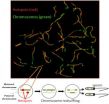(Press-News.org) Certain cases of major depression are associated with premature aging of immune cells, which may make people more susceptible to other serious illness, according to findings from a new UCSF-led study.
The findings indicate that accelerated cell aging does not occur in all depressed individuals, but is dependent upon how long someone is depressed, particularly if that depression goes untreated. The study was published online in March 2011 by the journal PLoS One and is available here.
"There's a lot more to depression than feeling blue," said first author Owen Wolkowitz, MD, a professor of psychiatry at UCSF. "As if feeling depressed is not bad enough, we are finding that long-term depression may be associated with damage to cells in the body, and this may predispose patients to certain physical diseases."
Previously considered a mental illness affecting only the brain, major depressive disorder, or MDD, now is believed to be tied to significant physical damage outside the brain, explained Wolkowitz. For example, depressed individuals are more likely to develop the diseases of advanced age, including diabetes, heart disease, osteoporosis, stroke and dementia.
In probing the links between depression and physical disease, the research team explored aging of the immune system as measured by the shortening of telomeres in immune cells taken from the blood.
Telomeres are tiny units of DNA-protein complexes that seal off and protect the ends of chromosomes and act as a biological clock controlling a cell's life. Telomere shortening predicts earlier onset of several major age-related diseases and earlier mortality, and may serve as one index of human longevity.
The researchers compared the length of telomeres in 18 individuals with MDD not currently receiving antidepressant medications to the length of telomeres in 17 healthy controls. Overall, telomeres of the depressed group did not differ from those of the healthy group; however, individuals with nine or more years of untreated chronic depression showed significant telomere shortening, even after accounting for chronological age. The degree of shortening in this subset of the depressed group corresponded to about seven years of "accelerated cell aging."
Telomere shortening also was associated with higher levels of inflammation and oxidative stress in patients, both linked to cell damage and premature aging. Oxidative stress is an imbalance between destructive "free radical" molecules and the body's ability to neutralize them with antioxidants. The authors suggest that telomere shortening in very chronic depression may reflect an individual's cumulative exposure to biochemical stressors that promote cell death and increase the likelihood of physical disease.
"While this finding itself might seem depressing, there is yet good news: many lifestyle factors like exercise and aspects of diet have been linked to longer telomeres," said co-author Elissa Epel, PhD, an associate professor in the UCSF Department of Psychiatry. "So while our personal history matters, it is possible that what we do today may matter even more, in terms of protecting our telomeres."
Epel and co-author Elizabeth Blackburn, PhD, UCSF professor of biochemistry and biophysics, pioneered research on the impact of psychological stress on several biological markers of cell aging. Blackburn shared the 2009 Nobel Prize in Physiology or Medicine for her telomere research and co-discovery of the cellular enzyme telomerase. Telomerase helps repair and restore telomeres, protecting cells from damage related to premature aging.
In related work, the research team recently reported in the journal Molecular Psychiatry, available here, that individuals with MDD show increased activity of the telomerase enzyme. Depressed individuals with the lowest telomerase activity before antidepressant treatment, and those with the greatest increase in activity during treatment, showed the strongest antidepressant responses. These findings suggest that the seemingly paradoxical increase of telomerase in untreated depressed individuals indicates their bodies are attempting to compensate for the damage to their telomeres. Increases during treatment, on the other hand, may represent true improvement in depression.
"We speculate that telomerase may provide a biological marker for antidepressant responses," Wolkowitz said. "Once we better understand these systems, we will be in a stronger position to treat depression and possibly prevent some of its associated physical illnesses."
INFORMATION:
As a next step, UCSF researchers plan to replicate these preliminary findings in a larger sample of depressed individuals in order to explain why certain people develop shortened telomeres and physical disease, and how that process can be combated. Depressed individuals not taking antidepressants are currently being enrolled for this ongoing study, and interested participants may inquire at (415) 476-7254 or mood@ucsf.edu.
Additional UCSF co-authors are Synthia Mellon, PhD; Jue Lin, PhD; Victor Reus, MD; Rebecca Rosser; Heather Burke, PhD; Eve Kupferman, PhD; Mariana Compagnone, MD; and J. Craig Nelson, MD. Co-authors from other institutions are Firdaus Dhabhar, PhD, of Stanford and Yali Su, PhD, of Kronos Science Laboratory.
The studies were funded by the National Institute of Mental Health, the O'Shaughnessy Foundation, the Bernard and Barbro Osher Foundation, and UCSF. Additionally, Blackburn, Epel and Lin are co-founders of a new company called Telome Health, Inc., which is developing applications of telomere biology to identify disease risk and to improve wellness.
UCSF is a leading university dedicated to promoting health worldwide through advanced biomedical research, graduate-level education in the life sciences and health professions, and excellence in patient care. More information is available at www.ucsf.edu.
Follow UCSF on Twitter @ucsf/@ucsfscience
Study finds link between chronic depression and accelerated immune cell aging
2011-04-06
ELSE PRESS RELEASES FROM THIS DATE:
Films For Action Launches New Website; Features Over 700 Films Hand-Picked to Change the World
2011-04-06
After 12 months in development, Films For Action has launched its new website - a head-to-toe redesign that lays the foundation for a vibrant community-powered news site dedicated to inspiring positive social change. At the heart of the new site is a constantly growing learning library of over 200 documentaries and 500 short films that can be watched free online, daily independent news, and a practical "Take Action" section to help users find ways to make a positive impact.
"It's probably the most comprehensive collection of films dedicated to social change online," ...
Story tips from the Department of Energy's Oak Ridge National Laboratory: April 2011
2011-04-06
MILITARY -- H2O from diesel
Capillary action and graphite foam are being enlisted by researchers at Oak Ridge National Laboratory to solve a logistical nightmare for the military and U.S. troops deployed around the world. While soldiers require nearly seven gallons of water a day, just getting that water to them increases troop vulnerability and limits their tactical use. Using an ORNL proprietary system, however, this problem could be greatly reduced. The system uses the pores of inorganic membranes to condense water present in a diesel's exhaust stream to produce about ...
Drought-exposed leaves adversely affect soil nutrients, study shows
2011-04-06
WEST LAFAYETTE, Ind. - Chemical changes in tree leaves subjected to warmer, drier conditions that could result from climate change may reduce the availability of soil nutrients, according to a Purdue University study.
Jeff Dukes, an associate professor of forestry and natural resources, found that red maple leaves accumulate about twice as much tannin when exposed to hot, droughtlike conditions. Those tannins, which defend leaves from herbivores and pathogens, were shown to interfere with the function of common enzymes in soil.
"When the leaves are particularly water-stressed ...
Happiness, comparatively speaking: How we think about life's rewards
2011-04-06
You win some, you lose some. You get the perfect job—the one your heart is set on. Or you get snubbed. You win the girl (or guy) of your dreams—or you strike out. Such are life's ups and downs.
But what if you win and lose at the same time? You land a good job—but not a great one. Or you do get a plum offer—but not the one you wanted?
A study published in an upcoming issue of Psychological Science, a journal of the Association for Psychological Science, says you'll find a way to be happy anyway.
"Good outcomes have relative value and absolute value, and that affects ...
George Mason students highlight dangers of distracted driving
2011-04-06
The HFES George Mason University (GMU) Student Chapter was recently featured in a television news story about an interactive driving simulation video game the students developed to highlight the human factors/ergonomics science behind distracted driving. The demonstration made its first appearance at the October 2010 USA Science and Engineering Festival in Washington, DC, where the GMU students partnered with the Federation of Associations in Behavioral & Brain Sciences (FABBS). Nearly half a million visitors attended the two-day festival, and the distracted driving display ...
tokyo rag Launches Inaugural Boutique Collection of Handmade Luxury Fashion Accessories
2011-04-06
tokyo rag, a handcrafter of high end fashion accessories, unveils a new 'Tokyo-inspired' collection for this summer. Covering a wide product range in distinctive and vibrant designs, tokyo rag targets women and men with rock star attitude, who are fresh in mind, never tired to explore and interested in couture and style. No snobbishness, just high quality accessories with a creative twist. Each piece is handcrafted using luxury fabrics and ecological tanned top quality leathers from carefully selected European tanneries.
The fashion accessories are available in four ...
MU researcher says instructors can reduce cheating by being clear
2011-04-06
A new University of Missouri study says that the reasons students give for cheating are rational, and that stricter punishments won't solve the problem. Instead, teachers should communicate clear standards and provide consistent enforcement to reduce instances of cheating.
Edward Brent, associate chair of the Department of Sociology in the MU College of Arts and Science, and Curtis Atkisson, an MU anthropology student, asked students, "What circumstances, if any, could make cheating justified?"
While a majority of the students said that no circumstances can ever justify ...
Elevated levels of sodium blunt response to stress, study shows
2011-04-06
CINCINNATI—All those salty snacks available at the local tavern might be doing more than increasing your thirst: They could also play a role in suppressing social anxiety.
New research from the University of Cincinnati (UC) shows that elevated levels of sodium blunt the body's natural responses to stress by inhibiting stress hormones that would otherwise be activated in stressful situations. These hormones are located along the hypothalamic-pituitary-adrenal (HPA) axis, which controls reactions to stress.
The research is reported in the April 6, 2011, issue of The Journal ...
NIH, USU study maps hotspots of genetic rearrangement
2011-04-06
Researchers have zoomed in on mouse chromosomes to map hotspots of genetic recombination — sites where DNA breaks and reforms to shuffle genes. The findings of the scientists at the National Institutes of Health and Uniformed Services University of Health Sciences (USU) have the potential to improve the detection of genes linked to disease and to help understand the root causes of genetic abnormalities. The research, published online April 3 in Nature, moves scientists one step closer to understanding how mammals evolve and respond to their environments.
In this image, ...
Analysis of opioid prescription practices finds areas of concern
2011-04-06
An analysis of national prescribing patterns shows that more than half of patients who received an opioid prescription in 2009 had filled another opioid prescription within the previous 30 days. This report also suggested potential opportunities for intervention aimed at reducing abuse of prescription opioids.
Researchers from the National Institute on Drug Abuse (NIDA), a component of the National Institutes of Health, will publish results of this analysis in this week's Journal of the American Medical Association (JAMA).
"More research is needed to see if current ...





